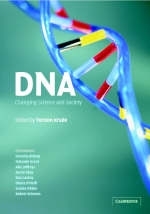
DNA
Changing Science and Society
Seiten
2003
Cambridge University Press (Verlag)
978-0-521-82378-4 (ISBN)
Cambridge University Press (Verlag)
978-0-521-82378-4 (ISBN)
- Titel ist leider vergriffen;
keine Neuauflage - Artikel merken
Eight key researchers come together to explore the impact of DNA on science and society, fifty years after Watson and Crick first revealed its double helix structure. From DNA fingerprinting to the ethical dilemmas of probing our genetic makeup, these essays are written to inform and entertain the general reader.
1953 witnessed a breakthrough in biological science, the revelation of the double helical structure of DNA. Since the original revelation by James Watson and Francis Crick, knowledge of the structure and function of DNA has dramatically changed science and society. This volume explores the dramatic impact that this discovery has had on our lives. Beginning with the story of the discovery of the double helix, the collection looks at DNA fingerprinting and its impact on forensic and legal medicine; the extraction of ancient DNA from archaeological and palaeontological remains; the ethical implications arising from the genetic knowledge encoded in our DNA; the complex role of DNA in the cause, detection and treatment of cancer; the debates surrounding the potential commercialisation of genetically modified crops; the emotive field of reproductive medicine; and finally how the genetic basis of developmental language disorders is teaching us more about how humans communicate.
1953 witnessed a breakthrough in biological science, the revelation of the double helical structure of DNA. Since the original revelation by James Watson and Francis Crick, knowledge of the structure and function of DNA has dramatically changed science and society. This volume explores the dramatic impact that this discovery has had on our lives. Beginning with the story of the discovery of the double helix, the collection looks at DNA fingerprinting and its impact on forensic and legal medicine; the extraction of ancient DNA from archaeological and palaeontological remains; the ethical implications arising from the genetic knowledge encoded in our DNA; the complex role of DNA in the cause, detection and treatment of cancer; the debates surrounding the potential commercialisation of genetically modified crops; the emotive field of reproductive medicine; and finally how the genetic basis of developmental language disorders is teaching us more about how humans communicate.
Introduction Torsten Krude; 1. The discovery of the Double Helix Aaron Klug; 2. Genetic fingerprinting Alec Jeffreys; 3. Ancient DNA Svante Pääbo; 4. DNA and cancer Ron Laskey; 5. DNA, biotechnology and society Malcolm Grant; 6. DNA in reproduction medicine Robert Winston; 7. Genes and language Dorothy Bishop; 8. DNA and ethics Onora O'Neill.
| Erscheint lt. Verlag | 18.12.2003 |
|---|---|
| Reihe/Serie | Darwin College Lectures |
| Zusatzinfo | 8 Plates, color; 32 Halftones, unspecified; 35 Line drawings, unspecified |
| Verlagsort | Cambridge |
| Sprache | englisch |
| Maße | 182 x 255 mm |
| Gewicht | 645 g |
| Themenwelt | Sachbuch/Ratgeber ► Natur / Technik |
| Informatik ► Weitere Themen ► Bioinformatik | |
| Naturwissenschaften ► Biologie ► Genetik / Molekularbiologie | |
| ISBN-10 | 0-521-82378-1 / 0521823781 |
| ISBN-13 | 978-0-521-82378-4 / 9780521823784 |
| Zustand | Neuware |
| Haben Sie eine Frage zum Produkt? |
Mehr entdecken
aus dem Bereich
aus dem Bereich
Grundlagen, Algorithmen, Anwendungen
Buch | Hardcover (2022)
Wiley-VCH (Verlag)
79,90 €
Nicht nur ein Ratgeber zum effektiven Computereinsatz
Buch | Softcover (2021)
Lehmanns Media (Verlag)
14,95 €


